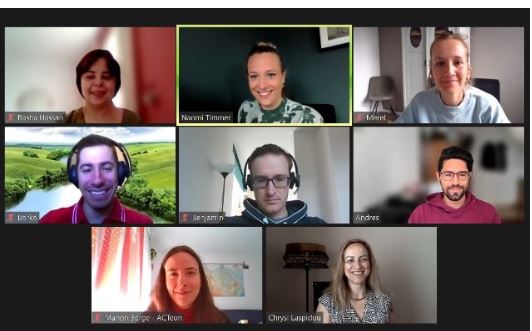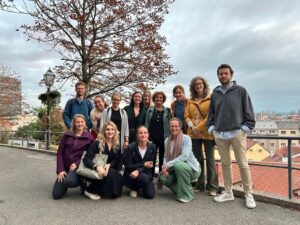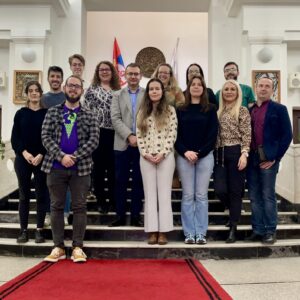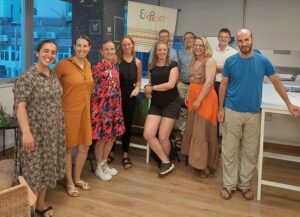EJWP Ambassador Chrysi Laspidou, professor in the Civil Engineering Department, University of Thessaly in Greece, provided 22 April 2021 in the EJWP2 Training Week a masterclass on personal career development and discussed the water nexus. This was Chrysi’s first time meeting with participants since she accepted to become a programme Ambassador in March. EJWP2 participants connected with questions about Chrysi’s career path, sector motivations, an uncertain future, and difficulties they expect to face. Read her first-hand account of this meeting and what Chrysi sees as vital in future possibilities.
‘It was an enriching first experience meeting with the EJWP2 participants all at the same time. To kick things off, they introduced themselves and how their diverse backgrounds fit into our group. I then shared highlights of my professional career: from the beginning in small town in Greece, including difficulties and bottlenecks in my path, how I’ve been a woman, a wife and a mother, and how I’ve been combining these roles with being a water professional myself. I think that they were inspired, and that was my goal. I followed with a one-hour seminar on the nexus of water-energy-food-land use-climate as well as how communities are affected by play a role in the use of resources.
I know these young people are going through difficult times with Covid restrictions and all that comes with that. Given that they’re young, this has been a large part of their careers, and they may not be sure how it will evolve. I tried to show them that the opportunities are there, and they need to look at ways to turn negative things into positive. I recounted years in my professional life that I thought were lost or wasted – but now I see as valuable. These participants have their work roles, and they may also be encountering opportunities that they don’t even see. My message was to look for the positive and to not give up on what they want to achieve, and it seemed to go over well through our connection that grew quickly. I was not sure what to expect in this first exercise as part of a training week, but we went further than I would have thought.
I see several points of value in being an EJWP Ambassador, including highlighting engagement in our environment and resources, supporting development of people working in our communities, expanding and sharing our green approaches to now and the future, and making the best use of digital resources. More than that, these elements need to actually come together. We need to identify these sustainable pathways, and people need to be well on board and coordinated to achieve green visions – especially our young people. Ultimately, I want to make science more accessible and applicable through embracing these concepts, and, with the help of Information and Communication Technologies giving ownership to our people with various fresh initiatives, such as citizen science programmes.
I’ve thought about the biggest challenges for young water professionals here in 2021, and how can we support their way forward. I had an impressive question from the group asking if it is even worth pursuing an academic career in these times? Well, you need to have the strength to survive some things to become successful, especially if you are a woman, given that our professional world is mainly a men’s world. We should recognize also that a lot of challenges can be on a psychological level. For example, as a woman, you may be doubted more in an academic/scientific field that is still dominated by men. Some work places are resistant to change, so you may get a door slammed on some very good fresh ideas. We have more women entering the field, but senior positions are still occupied by men. We need to be aware of steeper burdens of proof in some scenarios, with solid data ready to support our ideas going up the chain of command. Large egos of senior professionals can make it tough for a sensitive person to survive – so know your resilience!
As people in the water sector, we are sometimes overshadowed over by other sectors, such as energy, transportation etc. We need to demonstrate that our roles are vital. And as an EJWP Ambassador and a professor, I want to encourage more strategic green thinking, because if we continue our destructive behaviours towards nature, such as deforestation and lack of respect to nature, then we might see more consequences like outbreaks of viruses creeping into our communities. We can shorten value chains through cultivating more locally, with integration of water resource strategies in all sectors. I also aim to share more about developing tools using technology and hydro-informatics across domains – that can be readily shared to improve the whole system of people, economies and resources towards a more sustainable way of living’.






